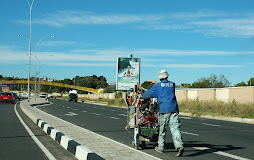
It is in the midst of summer. In Sub-Saharan Africa, it means we are entering the months of October-January and the seasonal temperatures ranges from 25 to 50 degrees Celsius. But come what may, if it is Christmas, our own Santa Clauses are dressed in “winter gear”- complete with red and white wool fibre costume and matching hat, as well as black boots to keep the snow out I presumed. As The Namibian illustrated with an image on December 13, 2007, which prompted this article, the streets are decorated with artificial snow flakes. In other words, if we cannot get the real thing, why not just make it up?
In their struggle for independence from Britain, Australians challenged this status quo when one of its citizens, developed a map that showed the southern hemisphere on top (figure 1). Nevertheless, Christmas cards in Australia still indicate colder climates- snow, woolly fibres, hats and boots.
How have we - the world that is- come to accept this Eurocentric norm? The idea of a winter dressed Santa Clause, in the hottest time of the year, is only one of the many absurdities of adopting western principles without reflecting on the underlying meanings and possible implications. But it is the concept of religion, definition of beauty and race that indicate just how the Eurocentric norm has become the
Religion
I cringe every time I walk into my grandmother’s house and see the image of the Last Supper that illustrates Jesus and his apostles as white. Walk into many of the established churches in Namibia and observe the images of the holy beings depicted as white. If we are taught that humans are created in the image of God, and the image of Jesus, the son of God, as well as the Holy Virgin Mary, are presented as white, what effect does that have on the black mind? The justification of Apartheid under theological grounds brought religion into the public sphere. Is it time to rethink the representations of the churches and their gods in Namibia?
Hair as the epitome of beauty
Hair is a constant reminder of race. I took the decision seven years ago to stop relaxing my hair. I am often told that I look ugly, my hair is “kroes” or better yet: “now you look just like real wamboe or like those Nigerians”. What does that mean? I can only speculate that among many Namibians, good hair equals long and silky- thus the relaxing or fake human hair that is so common among black Namibians. Bad hair equals curly and hard- thus it has to be “straightened” in order to get the kinks out. The common Coloured phrase “dink aan jou nageslag” (think about your offspring) says enough about the importance of hair and skin colour.
Racialism
If you are 50% black and 50% white, you are automatically classified as black. Coloureds emphasise their white blood, always not really sure what kind of black blood flow through their bodies. But then again, you might be looking white (blond hair blue eyes), nevertheless as you were born to coloured parents it means you have black blood thus cannot be totally white. You might be looking coloured (brown skin with long hair), but then as you were born to a black parent it means your black blood is too obvious, thus you cannot be classified as coloured. What exactly are we continuing to imply: that the blood from the black race is so strong that it overpowers and spoil the blood of the white race?
Is it not time to start thinking about underlying symbols that, in my view, continue to maintain the feelings of superiority and inferiority among so many whites and blacks, and especially in the coloured community?
In Racial Consciousness Micheal Banton tells the story of an American journalist that asked the President of Haiti:
“What proportion of the island is white? 95%, respond the President. Puzzled the journalist asked ‘how do you define white?’ The President responded by asking ‘how do you define coloured?’ Journalist responds, ‘well anyone with Negro blood is coloured’. The President responded: ‘Yes, that is our definition too, anyone with white blood is white’” (p. 67).
Says Banton: “Imaginary perhaps, but this shows that when there are two categories only, why would anyone choose the [lower defined race]”?
Independence brought an end to the ideology of a superior white race. But, Independence also needs to be reflected in our behaviour. What difference does it make if we change a street name from Kaiser Wilhelm to Independence Avenue, yet we still aspire to be or look like Kaiser Wilhelm?
